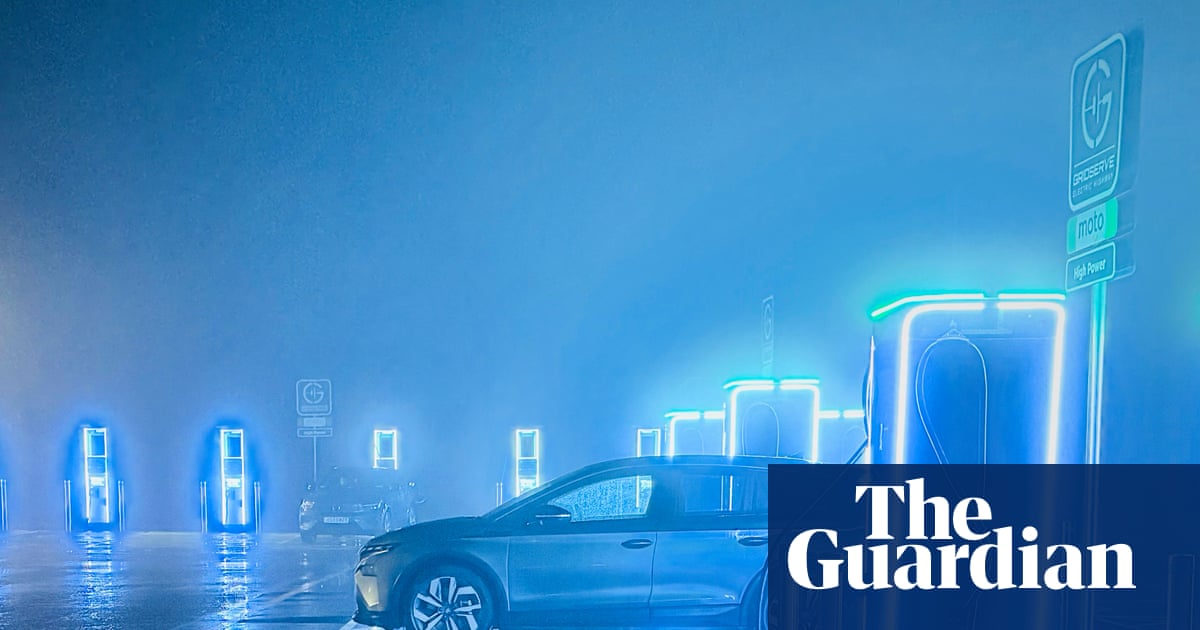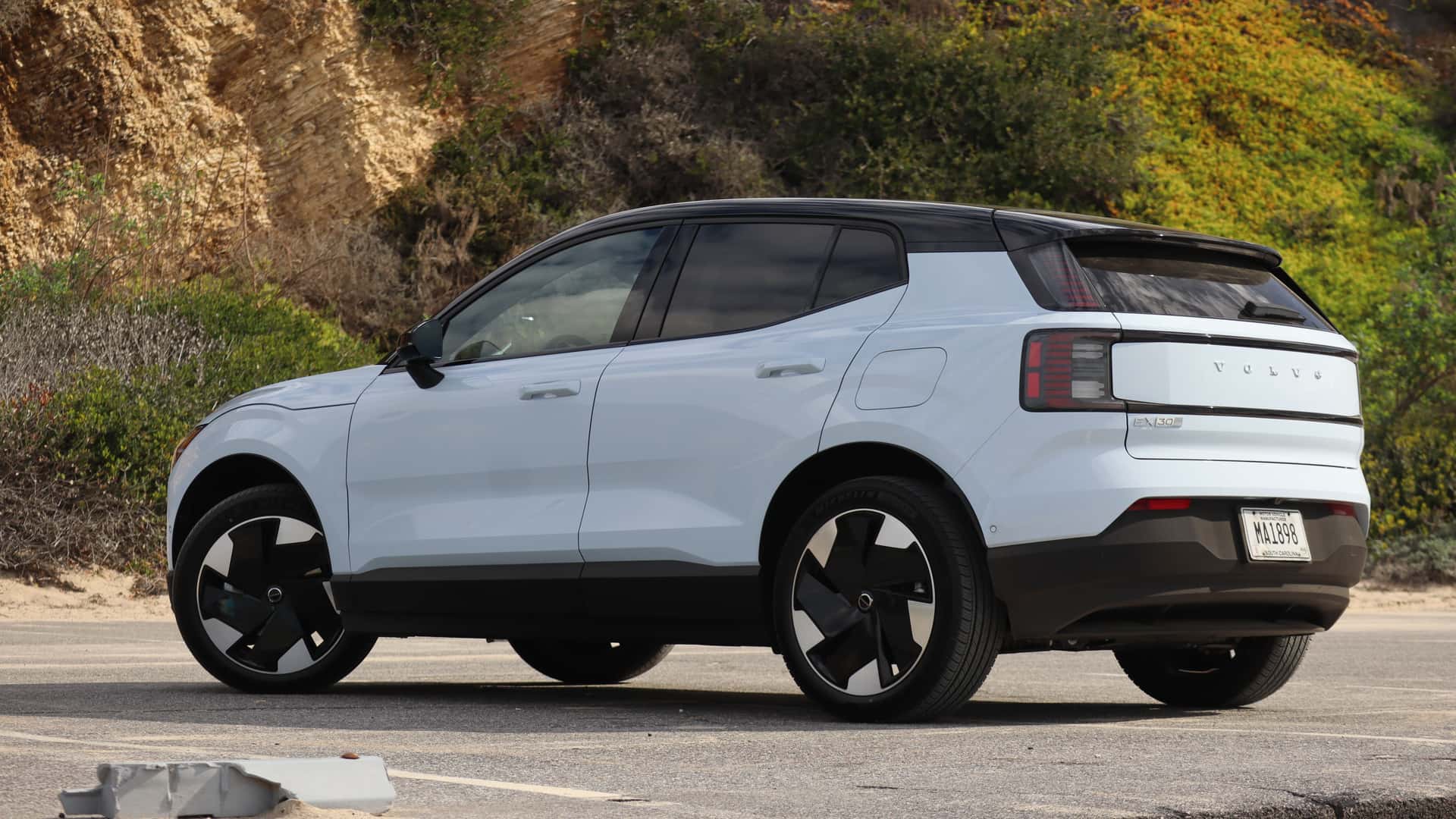Three pence: a small charge per mile for an electric vehicle, but a giant conceptual leap for Britain.
Chancellors of the exchequer have long resisted any form of road pricing as politically toxic. That may be about to change next week: Rachel Reeves, perhaps inured to being pilloried for any money-raising proposal, is expected to introduce a charge explicitly linked to how far EVs drive.
The Treasury has all but confirmed some kind of charge will be announced at next week’s budget, but the details have not been revealed. According to an initial report in the Telegraph, EV drivers could from 2028 pay a supplement based on how far they had driven that year on top of their annual road tax, or vehicle excise duty (VED). That could be a self-declared estimate of distance or a check on the odometer at an MOT.
According to Department for Transport (DfT) figures, battery electric cars – with lower running costs than petrol – are used more: clocking up about 8,900 miles on average in 2024. At 3p a mile, that would bring in £267 a car from the 1.4m EVs currently on the road – about £375m a year in total.
The transport secretary, Heidi Alexander, was at pains to rule out a national road pricing scheme in the face of Commons attacks on Thursday – although a later “clarification” made clear that the EV pay-per-mile was still on the table.
The long-term picture is a looming shortfall in motoring tax revenues, as income from fuel duty evaporates in the transition to EVs. Petrol and diesel cars effectively pay a charge linked to how far they drive – but via fuel consumption at the pump.
Fuel duty of 52.95p a litre (roughly 5p a mile in average cars) will bring in £24.4bn this financial year, according to the latest forecast from the Office for Budget Responsibility, but the billions will dwindle away from 2030, when the ban on new pure petrol and diesel cars comes in.
The challenge is to find a fair replacement for an unsustainable system – and overcome longstanding resistance on the right to any form of road charging, bundled up in the culture wars around London’s ultra-low emission zone (Ulez) and low-traffic neighbourhoods with their claims of curtailed freedoms and increased surveillance.
Some economists have championed schemes that would price roads by time and congestion – potentially fairer and a better tool to manage road use, but bringing in another level of tracking.
Any scheme should be kept simple, says Steve Gooding, the director of the RAC Foundation motoring thinktank. Although, when it comes to privacy, he adds: “The amount of data being generated by the modern car is phenomenal. If the DfT or DVLA start tracking their movements, people think Big Brother is watching. But Elon [Musk] – they’re not that fussed.”
A wider concern is that pay-per-mile would discourage drivers from switching to electric vehicles, crucial for cutting carbon emissions. Manufacturers, businesses and motoring groups such as Ford, AutoTrader and the AA have all spoken out on the timing of new charges at this point in the transition. Carmakers must, under Britain’s ZEV mandate, ensure one in three cars sold next year are zero-emission, rising to 80% by 2030 (with hybrids allowed to make up the remaining 20%).
While grants remain of up to £3,750 on new electric vehicles and – for some – the running costs remain much cheaper, some discounts or tax and charge exemptions have already ended. Transport for London recently confirmed EVs would be liable for the capital’s congestion charge from next year, and zero-emission cars started paying VED in April.
According to a report for the Social Market Foundation (SMF) thinktank, New Zealand provides a cautionary tale. EVs were made liable last year for its road-user charge, which previously only applied to diesel vehicles, whereby drivers buy paper permits in units of 1,000km (621 miles). The move, allied to the end of buyer grants and tax exemptions, led to a sharp drop in new EV sales – now just 4% of the market, having peak 19%.
SMF says that Iceland, which also brought EVs into pay-per-mile schemes last year, maintained incentives and differentials in pricing and had a much smaller decline in market share.
Advocates for the new technology are alarmed. The Electric Vehicle Association England, a group representing drivers, warned in a letter to the chancellor that consumer sentiment was still sceptical about EVs.
after newsletter promotion
For many, running costs are no longer the incentive they once were – particularly for those reliant on public charging points, usually in poorer areas and without a driveway. Ginny Buckley, the chief executive of Electrifying.com, an EV reviews platform and marketplace, says: “If you can’t rely on off-peak, affordable home charging and you’re reliant on the public charging network, for many people it will cost you more per mile to run your EV than it will a petrol car.”
Graham Parkhurst, a professor of sustainable mobility at the University of the West of England, describes the vast difference between domestic chargers and public charging points – which attract VAT at 20% on top – as a “political timebomb”, further dividing the haves and have-nots.
Even long-term proponents of pay-per-mile such as Parkhurst warn of the need to tread carefully: “Charging according to how much a vehicle moves makes sense. Fuel duty does that. But we need time to work out how to do this in the context of wider transport taxation. To the extent we need cars, it’s much better that they are electric,” he says.
The thinktank the Resolution Foundation recommends a charge based on miles driven and weight be brought in only for future EV sales, as part of VED.
Tanya Sinclair, the chief executive of the industry group Electric Vehicles UK, agrees that motoring taxes need fundamental reform – but the government needs to be absolutely clear it wants people to switch to EVs. “Anything that muddies that message – such as giving a grant with one hand and introducing pay-per-mile with the other – undermines that clarity for the consumer,” she says.
A government spokesperson says it would “look at further support measures” for EVs, but adds: “Fuel duty covers petrol and diesel, but there’s no equivalent for electric vehicles. We want a fairer system for all drivers whilst backing the transition to electric vehicles.”
For Gooding “the best time to introduce road pricing would have been a while ago – but politics has been an interesting place”. The cross-party transport select committee recommended the urgent introduction of road pricing – replacing all motoring taxes for every type of vehicle – in 2022. But no ministers have fancied it; London’s mayor, Sadiq Khan, battered by anti-Ulez hostility, last year had to rule out even considering a pricing scheme, despite once talking of it as the sensible option.
Piloting a new policy is, Gooding says, best done “with the smallest number you can get away with – and if it’s only EVs, that’s better than trying to introduce some kind of complicated charge for the 34m cars we’ve already got”.
For some, including Buckley and the Campaign for Better Transport, an obvious, if also politically contentious, answer remains: end the 15-year freeze on fuel duty and the temporary 5p cut in place since 2022.
Had the levy stayed the same in real terms, almost £150bn would have accrued to the public purse, according to SMF. Whatever pay-per-mile scheme evolves, Reeves “must ensure operating taxes on EVs remain lower than on petrol”, it says. “The simplest way to maintain that difference is to raise fuel duty.”









